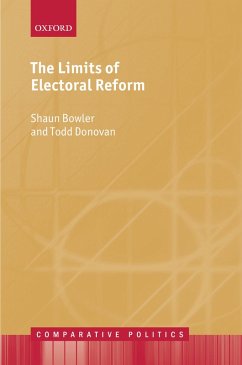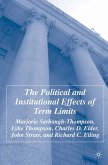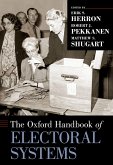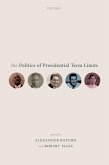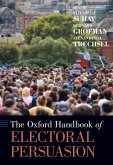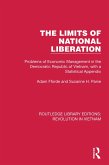Institutions 'matter' to electoral reform advocates and political scientists - both argue that variation in electoral institutions affect how elected officials and citizens behave. Change the rules, and citizen engagement with politics can be renewed. Yet a look at the record of electoral reform reveals a string of disappointments. This book examines a variety of reforms, including campaign finance, direct democracy, legislative term limits, and changes to the electoral system itself. This study finds electoral reforms have limited, and in many cases, no effects. Despite reform advocates' claims, and contrary to the 'institutions matter' literature, findings here suggest there are hard limits to effects of electoral reform. The explanations for this are threefold. The first is political. Reformers exaggerate claims about transformative effects of new electoral rules, yet their goal may simply be to maximize their partisan advantage. The second is empirical. Cross-sectional comparative research demonstrates that variation in electoral institutions corresponds with different patterns of political attitudes and behaviour. But this method cannot assess what happens when rules are changed. Using examples from the US, UK, New Zealand, Australia, and elsewhere this book examines attitudes and behaviour across time where rules were changed. Results do not match expectations from the institutional literature. Third is a point of logic. There is an inflated sense of the effects of institutions generally, and of electoral institutions in particular. Given the larger social and economic forces at play, it is unrealistic to expect that changes in electoral arrangements will have substantial effects on political engagement or on how people view politics and politicians. Institutional reform is an almost constant part of the political agenda in democratic societies. Someone, somewhere, always has a proposal not just to change the workings of the system but to reform it. The book is about how and why such reforms disappoint. Comparative Politics is a series for students, teachers, and researchers of political science that deals with contemporary government and politics. Global in scope, books in the series are characterised by a stress on comparative analysis and strong methodological rigour. The series is published in association with the European Consortium for Political Research. For more information visit: www.ecprnet.eu. The Comparative Politics series is edited by Professor David M. Farrell, School of Politics and International Relations, University College Dublin, and Kenneth Carty, Professor of Political Science, University of British Columbia.
Dieser Download kann aus rechtlichen Gründen nur mit Rechnungsadresse in A, B, BG, CY, CZ, D, DK, EW, E, FIN, F, GR, HR, H, IRL, I, LT, L, LR, M, NL, PL, P, R, S, SLO, SK ausgeliefert werden.

